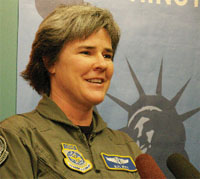Another DADT trial, but a different DOJ tack

Margaret Witt
The story of Air Force Reserve Major Margaret Witt has some drama to it and that drama may well be trotted out this week as a U.S. District Court judge hears the lawsuit challenging her discharge under “Don’t Ask, Don’t Tell.”
Judge Ronald Leighton, a George W. Bush appointee, has rejected a request by Witt’s attorneys to exclude from evidence any testimony or documents pertaining to the details of her early relationship with her partner of six years, Laurie McChesney. They say it is irrelevant to the reason why she was discharged from the military—for being gay.
But attorneys from the U.S. Department of Justice the evidence regarding Witt’s “admitted commission of adulterous acts” is “the very conduct that triggered her discharge.”
Hunh? What’s going on here? It is well known that Witt, 46, was discharged in 2006 for having acknowledged she had a relationship with a woman. Her case has received widespread attention. There was considerable discussion of it on the U.S. Senate floor this year by Republicans angry that U.S. Solicitor General Elena Kagan—now U.S. Supreme Court Justice Kagan—had not fought Witt’s lawsuit all the way to the Supreme Court. What do “adulterous acts” have to do with it?
Hardball. Witt won the right to a trial on the merits of the military’s application of the “Don’t Ask, Don’t Tell” (DADT) law against her. Now, she’s getting that trial, and the DOJ says there’s a price to pay.
“Having insisted at every turn that she is entitled to an as-applied analysis of the application of [DADT] to her specific circumstances,” said Assistant Attorney General Tony West in a brief opposing Witt attorneys’ request to exclude evidence regarding Witt’s early relationship with McChesney, “plaintiff cannot now plausibly argue that the Court should ignore evidence of the very conduct that triggered her discharge. Evidence of plaintiff’s conduct is directly relevant to what the [9th Circuit U.S.] Court of Appeals identified as the material questions at issue in this matter: “whether the application of [DADT] specifically to Major Witt significantly furthers the government’s interest and whether less intrusive means would achieve substantially the government’ s interest.”
In other words, if Witt has won—for herself and others in the 9th Circuit states—the right to a trial in federal court when the military seeks to discharge them for being gay, then gay servicemembers need to be prepared for whatever the government can put forward to justify that discharge.
In Witt’s case, what the government put forward is that the military first became aware of Witt’s homosexuality when McChesney’s then-husband emailed Witt’s superior officers and reported the affair. Prior to this revelation in court documents leading up to this week’s trial, most news reports had conveyed Witt’s story that she was discharged for having been in a long-term relationship with a civilian woman after that relationship had broken up.
“Instead,” said West, “it was plaintiff’s relationship, beginning in November 2003, with a different civilian woman” that led to her discharge. “This particular civilian woman was married at the time plaintiff began a relationship with her. The woman’s husband brought the relationship to the Air Force’s attention.”
According to West’s brief, Witt’s unit commander recommended Witt be separated from the service.
“Among the reasons for this recommendation: plaintiff ‘engaged in homosexual acts with . . . a married woman, on divers occasions from on or about November 2003 to on or about January 2004. . . .”
Because Judge Leighton has rejected Witt attorneys’ request to exclude the information that Witt’s relationship with Laurie McChesney was, for a time, taking place while McChesney was still married to her husband, the DOJ will apparently attempt to justify Witt’s discharge based on other conduct, in addition to her being gay.
“[A]n officer who engages in adultery risks compromising her stature as an officer,” wrote West in his August 23 brief. “The risks of such behavior were enunciated long ago by Congress in Articles 133 and 134 of the Uniform Code of Military Justice, which subjects officers regardless of sexual orientation to punishment for adultery in certain circumstances. By reducing those risks, plaintiff’s discharge furthers unit cohesion, morale, and good order and discipline.”
“It will be tough on Major Witt because of the intrusive nature of the discussion,” said former Army Colonel Grethe Cammermeyer, who was in the U.S. District Court for Western Washington on Monday for the first day of the seven-day trial. Cammermeyer, whose story was the subject of a movie starring Glenn Close, was discharged from her position as Chief Nurse of the Washington State National Guard in 1989, for simply stating, “I am a lesbian.”
Also, in the court, said Cammermeyer, was Air Force Lt. Colonel Victor Fehrenbach, a highly decorated combat pilot who had a DADT investigation initiated against him based on information provided to the military by a civilian. His lawsuit fighting discharge is currently pending in the U.S. District Court for Idaho.
The beginning of Witt’s trial follows by less than a week a decision from the U.S. District Court in Riverside, California, declaring DADT to be a violation of the First and Fifth amendment rights of the federal constitution. The opinion in that case, Log Cabin Republicans v. U.S., will likely be appealed to the 9th Circuit U.S. Court of Appeals.


Leave a Reply